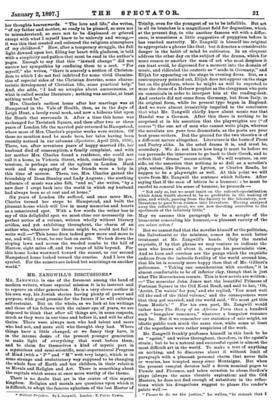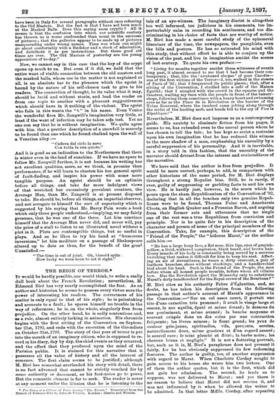MR. ZANGWILL'S DISCUSSIONS.*
Mx. ZANGWILL is one of the foremost among the band of modern writers, whose especial mission it is to instruct and to reprove an older generation. He is a very clever author in his own way, his Jewish stories having plenty of power and purpose, with good promise for the future if he will cultivate self-restraint. But on the whole, as we look at his writings and those of his fellows with the calmer eye of years, we are disposed to think that after all things are, in some respects, much as they were in (=time and before it, and will be after theirs. There were always men who had talent and more who had not, and more still who thought they had. Where things have a little changed, or we fancy they have, is in the intense desire cf the present younger generation to make light of everything that went before them, and to claim for themselves a kind of mystic part in a mysterious and semi-scientific, semi-supernatural Progress of Mind (with a " P " and "M" writ very large), which is in some strange and evolutionary way supposed to be changing the whole face of Earth and her children, in their relation to Morals and Religion and Art. There is something about the capitals which seems at once more worthy of the theme.
.There is no doubt that art is the centre of this mystic kingdom. Religion and morale are questions upon which it is difficult, to adopt the famous aphorism of the last Master of
• Without Prrjudlea. By I. Zangwill. London • T. Fisher Unwin.
Trinity, even for the youngest of us to be infallible. But art in all its branches is a magnificent field for dogmatism, which at the present day, to cite another famous wit with a differ- ence, is sometimes a little suggestive of puppyism before it. has reached maturity. Mr. Zangwill is himself too original to appropriate a phrase like that ; but it denotes a considerable danger in the habit of mind he cultivates. In an eloquent address the other day on the subject of the drama, which far some reason or another the man of art who most despises it can least avoid, he digressed for a moment into the domain of music, and ridiculed the oratorio as "made in Germany," and Elijah for appearing on the stage in evening dress. Bat, as a contemporary pointed out, Elijah does not appear on the stage but on the platform, where he might as well be expected to wear the dress of a Hebrew prophet as the clergyman who puts on canonicals in order to interpret him at the reading-desk.
And oratorio did not come from Germany, but from Italy, in its original form, while its present type began in England.
And we were almost irresistibly impelled to the conclusion that what Mr. Zangwill chiefly knew about music was that Handel was a German. After this there is nothing to be surprised at in his assertion that the playwrights are (" of course") the one set of men who cannot write plays, whereas the novelists are your true dramatists, as the poets are your best prose-writers. But the ground for the two theories is of a different nature altogether. Literature is the basis of Prone and Poetry alike. In the acted drama it is, and must be, secondary. We do not know how long it must be before we can persuade the innovators to go back to their Greek, and to reflect that "drama" means action. We will venture, on our side, on the assertion that nothing is so dull as a novelist's play, unless, like Dumas, or Lytton, or Charles Reade, he happen to be a playwright as well. At this point we will quote from Mr. Zangwill the sentence which follows. After saying that if the man of letters be a humouri he must be careful to conceal his sense of humour, he proceeds :— "Not only so, but we must insist on the sub-sub-specialisation which Adam Smith showed to be so profitable in the making of pins, and which, passing from the factory to the laboratory, now threatens to pass from science into literature. Having analysed away the infinitely great, we are now devoting ourselves to the apotheosis of the infinitely little."
May we assume this paragraph to be a sample of the humourist concealing his humour,—a pleasant variety of tie ars celare artem ?
But we cannot find that the novelist himself or the politician, the Salvationist or the minister, comes in for much better treatment at Mr. Zangwill's bands. Only the mental exquisite, if by that phrase we may venture to indicate the man who knows all about it, escapes his pessimistic view. And so keen and cureless are the pangs which the exquisite endures from the imbecile fertility of the world around him, that his lot is scarcely more happy than that of Mr. Gilbert's policeman. "Taking one consideration with another," it is almost comfortable to be of inferior clay, though that is just what The Meerschaum resents. This is how novels are written : —" The muscular John Jones met the beautiful Princess of Portman Square in the Old Kent Road, and said to her, Oh, 'Arriet, I'm waitin' for you,' and she replied, 'You must wait till the end of the third volume,' and the consequences were that they got married, and the world said, 'We must get this from Mudie's.' " For his own part, Mr. Zangwill would rather have The Story of an African Farm than a hundred such "bungalow romances," whatever a bungalow romance may be. But if we remember our statistics of sale aright, an idiotic public took much the same view, while some at least of the superfines were rather suspicious of the work.
Mr. Zangwill frankly professes himself in this book to be an "egoist," and writes throughout, therefore, in the egoist's strain ; but to be a natural and successful egoist is almost the most difficult art in the world. To make a text of anything on nothing, and to discourse about it without limit of paragraph with a pleasant personal charm that never fails or wearies, has tempted many since Montaigne. But when the present essayist devotes half a dozen nominal pages to Fiesole and Florence, and takes occasion to abuse Sardoe's plays (always the same theatric aspiration) and the Old Masters, be does not find enough of substitute in the reflec- tions which his divagations suggest to please the reader's palate well :—
" Please to do me the justice," he writes, "to remark that I have been in Italy for several paragraphs without once referring to the Old Masters. But the fact is that I have not been much at the Masked Balls. Does this saying seem cryptic ? All it means is that the confusion into which our scientific century has thrown us is worse confounded than usual in the universe of pictures ; that the galleries appear to be made up of pictures masquerading under wrong names. Time was when one might go about comfortably with a Biedeker and a stock of admiration, and distribute it as per instructions. But these good old times are over. The Old Masters of yesterday are the young apprentices of to-day."
Now, we cannot say in this case that the key of the crypt opens up much to us. Bat even if it did, we hold that the entire want of visible connection between the old masters and the masked balls, whose use in the matter is not explained at all, is an absolute bar to the pleasure which the egoist is bound by the nature of his self-chosen task to give to his readers. The connection of thought, be its value what it may,
-should be lucid and without strain, and lead the reader on from one topic to another with a pleasant suggestiveness which should have in it nothing of the violent. The egoist who fails in this wants the " t " in his name. Even Venice the wonderful fires Mr. Zangwill's imagination very little, at least if the want of infection may be taken sale. test. Yet no -one can say that he is without imagination. We quite agree with him that a prettier description of a snowfall is scarcely to be found than one which he found chalked upon the wall of a Venetian alley :—
" Cadeva dal cielo in neve Con tutta la sua quiete."
And it is good as an indication to the Northerners that there
is winter even in the land of sunshine. If we have no space to follow Mr. Zangwill farther, it is not because his writing has not excellent qualities, more, as we think, in promise than
performance, if he will learn to chasten his too general spirit -of fault-finding, and inspire his power with some more tangible purpose. An egoist should be an optimist before all things, and take far more indulgent views of that wretched but excessively prevalent creature, the Average Man, than Mr. Zangwill is at present disposed to take. He should be, before all things, an impartial observer, and not arrogate to himself the sort of superiority which is suggested by his saying that Mr. Barry Pain wrote a book which only three people understood,—implying, we may fairly presume, that he was one of the three. Let him convince himself that the Average Man never did, and never will, pay the price of a stall to listen to an illustrated novel without a plot in it. Plots are contemptible things, but so useful in plays. And as he likes to try his hand at "humorous inversions," let him meditate on a passage of Shakespeare altered up to date as thus, for the benefit of the great Unsatisfied:—
" The time is out of joint. Oh, blessed spite. How lucky we were born to set it right."















































 Previous page
Previous page